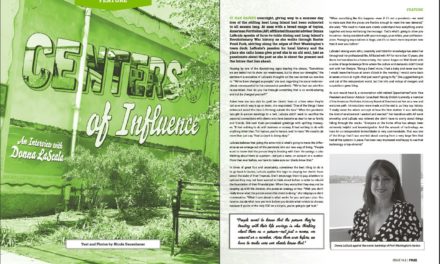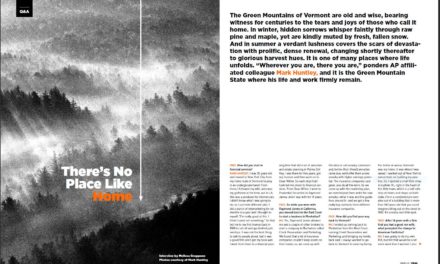
Words of Wisdom: 20 Questions with CFO Damon B. Joyner
American Portfolios Chief Financial Officer Damon B. Joyner possesses all the characteristics one would expect from an old soul—among them: intellect, humor and humility. These qualities make his words of wisdom reach listeners with the persuasiveness of a Sunday sermon.
To view the full article please register below:
Words of Wisdom: 20 Questions with CFO Damon B. Joyner
American Portfolios Chief Financial Officer Damon B. Joyner possesses all the characteristics one would expect from an old soul—among them: intellect, humor and humility. These qualities make his words of wisdom reach listeners with the persuasiveness of a Sunday sermon. Born into a Southern blue-collar family, Joyner worked his way through college, spreading roots early on to build a career in the financial services industry. His resume spans more than 30 years, during which time he honed his vast expertise, leading to being consistently and highly recognized for exceptional performance. After facilitating the sale of Sterne Agee & Leach and Sterne Agee Clearing in 2016, Joyner seized an opportunity with AP—one that meant moving his family from Birmingham, Alabama, to Long Island, New York. It was a bold career move, to be sure—and one on which he looks back with zero regrets.
FREE: What’s the most challenging aspect of your position?
DAMON JOYNER (DJ): Our end-customer needs are always changing. The American Dream is exciting, but also a little daunting. It changes every day because life doesn’t move in a straight line. One of our biggest challenges is staying ahead of the curve, although this business is not difficult to understand. Our job is simply to partner with our financial advisors in helping their clients reach the American Dream.
FREE: What’s your favorite quote?
DJ: Colin Powell said something I’ve never forgotten. “Leadership is solving problems. The day soldiers stop bringing you their problems is the day you have stopped leading them. They have either lost confidence that you can help or concluded you do not care. Either case is a failure of leadership.”
FREE: Why did you decide to go into financial services?
DJ: A high school teacher, Mr. Cooper, got me interested in the market. We were supposed to be learning architecture; instead, he taught us about how to trade pork bellies and commodities. I was
hooked. My first real job out of high school was working in the financial services business in the daytime and going to school in the afternoon and at night. I became a financial advisor for a number of years and then got into management.
FREE: So, you could say Mr. Cooper was responsible for setting you on your career trajectory?
DJ: Yes. My mom and dad thought I was going to go study architecture. Reality was, I didn’t give a rip about architecture. Mr. Cooper taught us about the markets 90% of the time, and maybe the last 10 minutes of class we’d get a little architecture in. Sometimes you learn something in life from the strangest situations. Who would’ve thought that, starting out as a 10th grader learning how to trade, I’d be here 33 years into this industry?
FREE: What made you decide to join AP?
DJ: My wife.
FREE: How so?
DJ: About six years ago, I consulted here for 18 weeks, during which time Lon [Dolber, CEO] offered me a role; honestly, I wasn’t sure at first if AP and Long Island were right for me. I was living
in Birmingham, Alabama, and we had just sold the business unit I ran to a competitor. I was on garden leave for 12 months, which was about to end. Lon, being incredible at reading people, said,
“I understand you have some hesitancy. Why don’t you invite your wife up? We’ll show her around.” So, we went to dinner—my wife, Betsy, and I, and Lon and his wife, Deb. Lon spoke to Betsy one-on-one like she was the only person in the room, explaining what AP does, how they do it, what drives him, why he gets up in the morning, why he thought I was a good person for the role. Dinner was over and as we walked to my car, before I put the key in the ignition, Betsy looked at me and said, “You have to take this role.” I said, “I didn’t think you would be willing to uproot our three [school-aged] boys and move to Long Island for this opportunity.” Her comment was, “This is a guy that’s 180 degrees different than anyone you’ve ever worked around.” She said, “I don’t know the future, but you have to at least be open for this experience because I think it has the potential to change you. You won’t be the same person if you come in arms wide open.” And she wasn’t wrong. It’s been the best five years of my career.
FREE: Tell us something people may not know about you.
DJ: I love music—not performing, but listening and watching. What most people don’t know is probably two to three times a week, Lon and I text each other at night because we’ve watched
some music documentary and want to make sure the other person has seen it or puts it on their watch list. The spooky thing is, and I kid you not, there have been times on a Saturday night when
I’ll text him and say, “Hey, I’m watching the Rolling Stones documentary. And he’s like, ‘Me too!’”
FREE: [laughing] Great minds, eh? So, from where does your love of music stem?
DJ: I grew up in Nashville, Tennessee. My dad studied music in college, so I grew up with all types of music in my home. I have great admiration for musicians.
FREE: In addition to CFO, you also serve as the branch manager for the Holbrook, New York, branch office?
DJ: When Tim [O’Grady, former president of American Portfolios Financial Services, Inc.] passed away, it left a big void in everybody’s life, one being that he was also the Holbrook branch
manager. When Lon decided to step in as president, Dalchand [Laljit, Chief Administrative Officer], Craig [Vollono, Chief Legal Counsel] and I also stepped up and said, “We’re never going
to be able to replace Tim, but what can we do to help?” I’ve always done my best to walk in the shoes of the financial advisor because I was one and I understand how frustrating it can be when
you don’t have a back office that supports you. Dalchand always says, “If it’s not important to the customer, then what are you doing?” Well, I saw an opportunity to learn more from our customer and asked Lon to allow me to be the branch manager. Lon was a little confused and said, “Well, you’re my CFO. Why do you also want to be the branch manager?” I told him, “It gets me back to where I started—face-to-face with financial advisors.” Lon was a little skeptical, but he said he would let me do it and make David Molter [Vice President of New Business Development and Advisor Relations] the assistant branch manager, and see what happens. I never looked back. That’s what gets me up in the morning.
FREE: Of the many hats you wear, you’re also treasurer on the board of directors for the AP Foundation, Inc., which you were instrumental in restructuring. Why do you think companies have a duty to be socially responsible?
DJ: To me, being socially responsible is simply helping your neighbor in need. Money’s important and you should earn it in a transparent, fair and honest way; but, once you take care of your basic
needs, it’s your responsibility to build a bigger table. I was a tool to help get the foundation up and running, but Lon—as usual—was two steps ahead of me. We’re not a multi-billion-dollar company, so there’s a limit to what we can do. We have to be strategic in the giving of our time and talents. The foundation is like a conduit to help those in need. When history judges our firm, I don’t necessarily want us to be known for how much money we made, how big we grew in terms of AUM or how many people we employed, but for how we used our excess resources to help our neighbors in need.
FREE: What does it take to be a good leader?
DJ: Commitment to constant improvement; ownership of problems; staying humble [laughs]. My wife has a way of keeping me incredibly humble. She will never allow me to believe my own print.
She’s very good at reminding me, “Hey, don’t forget where you came from.”
FREE: What are some attributes you admire about fellow colleagues?
DJ: What makes them successful, at least in my eyes, is they always put their clients before themselves. I think clients know that and they reward you with loyalty.
FREE: If there is one thing that you could say to the field, what would it be?
DJ: Continue to provide us your feedback so we can deliver the tools and resources to help their clients’ reach the American Dream.
FREE: What would be your most memorable interaction with an AP advisor or coworker?
DJ: Mopping up where a commode overflowed in the branch.
FREE: Oh, gosh!
DJ: One of our advisors opened the door to show their client where the bathroom was and said, “Hello, I’d like you to meet Damon Joyner, the branch manager. Damon, this is my largest client.” I looked up—I was on my hands and knees, and I had paper towels trying to clean up. They were shocked.
FREE: That’s some introduction. I guess that’s as good a transition as any. What does customer service mean to you?
DJ: Service means something different to everyone. I don’t own the branch, but I own the overflowing commode. I don’t pass blame and spend time trying to figure out how it happened; you fix
it and you move on. Our job is to solve the challenges our financial advisors have. It can be an overflowing commode or attending a client event. If it’s important to them, it’s important to me.
FREE: Where might we find you on the weekend?
DJ: I make my wife breakfast every Saturday morning, then we usually go to Home Depot, Lowe’s and Costco. After that, we’re usually in the yard; I love to garden with my wife and we also enjoy using our smoker to slow cook ribs, brisket or chicken. In the evenings, weather permitting, we take long walks on the beach or around our village. I live a very simple lifestyle. I usually get up at 4:30 or 5 a.m. every day and read the first couple hours. I also meditate and pray. If my mornings don’t start off with my routine, I feel like something important to me is missing for the rest of the day. That time is absolutely sacred; I wouldn’t give it up for anything.
FREE: What do you like to read?
DJ: Right now, I’m reading “Inside Money: Brown Brothers Harriman and the American Way of Power.” Prior to that, I read “The Storyteller” by Dave Grohl [of Nirvana, Foo Fighters]. My interests are all over the place. Lon and I trade books back and forth.
FREE: If there’s one thing on your bucket list that you would like to accomplish, what would that be?
DJ: I love the Grand Tetons. I think it’s probably one of the prettiest places on Earth. I think I’d love to have the firm back at Grand Teton [for Ascend]. The best time to go is either early spring or late fall before it gets too touristy or too cold.
FREE: When you look at where we stand as a company today, now 20 years old, how would you say we’re doing?
DJ: Think about where we’ve come from. We started on 9/11. The 2022 budget we put together is built on $300 million in top-line revenue; $40 billion in AUM; nearly 130 home office associates
serving approximately 800 financial advisors. And to think, we’re doing that as a 100% privately-owned financial services company.
FREE: Furthermore, the company and industry have experienced its share of rocky and tumultuous times.
DJ: We grew during COVID in terms of number of advisors, home office associates, AUM and revenue. It’s pretty amazing to think what Lon and the original eight folks who joined him built. When I tell some of my colleagues in the 1099 space our goal is $300 million in top-line revenue next year, it astounds them because we’re not owned by a public organization. We’re not a
mom-and-pop firm, but not a publicly-traded firm; we’re an in-betweener, we’re an anomaly. There are not many of us around.
FREE: Why do you think that is?
DJ: They sacrifice long-term growth for short-term profitability. Lon gets a call every couple weeks from someone trying to dangle money in front of him. As CFO, it’s reassuring to know that month-to-month, quarter-to-quarter and even year-to-year, profitability doesn’t influence Lon’s long-term vision.
FREE: Our theme for this issue of FREE is forecasting the future. Tell us what you think the next 20 years look like.
DJ: I think it’s up to folks like you and me to decide, do we want AP to exist in the next 20 years? If so, Lon’s laid the foundation; we just have to continue to improve upon it. We’ve only scratched the surface on the ways we can help our advisors, both in terms of technology and support. They could spend all their time in front of their clients if we removed all the other static and busy work. They will make more money as a result of serving more clients and helping those clients reach their American Dream. The more we can take the static out through technology and customer service, the more the numbers grow and the more impactful we can be in our community.
FREE: That’s what it’s really all about. This was a great conversation, Damon. Thank you for your time.
DJ: Excellent. Thank you, ma’am.
Please reference disclosures: https://blog-dev.americanportfolios.com/disclosures/












